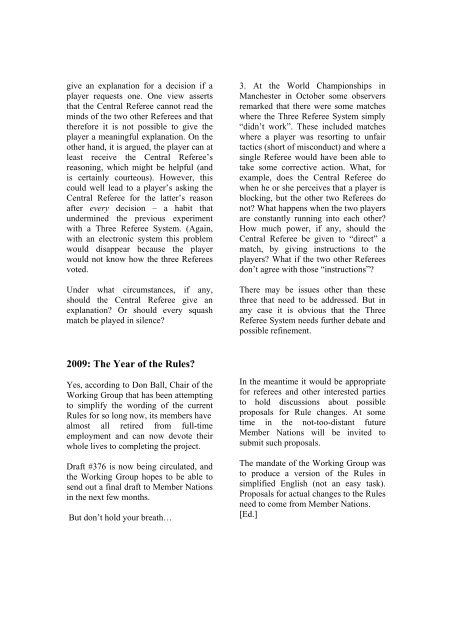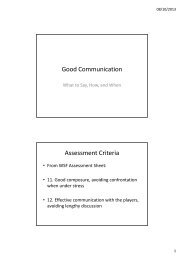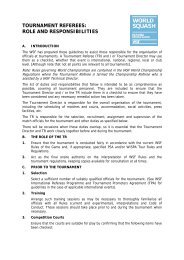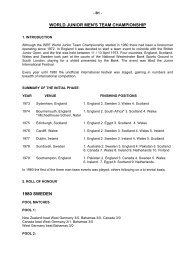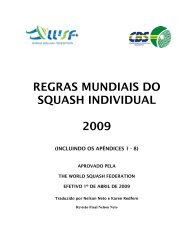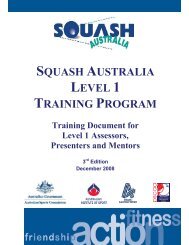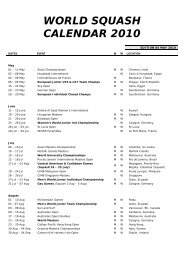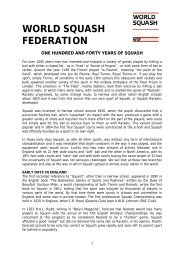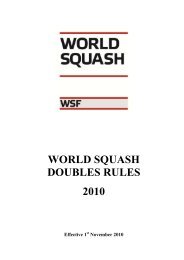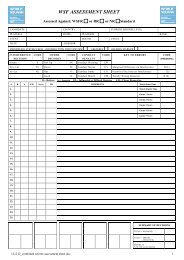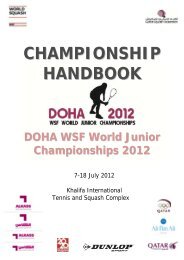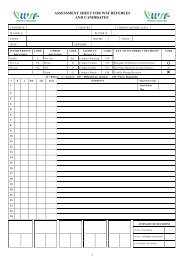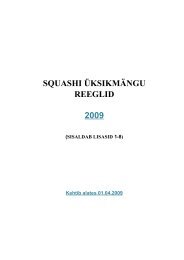Referees' Review - World Squash Federation
Referees' Review - World Squash Federation
Referees' Review - World Squash Federation
You also want an ePaper? Increase the reach of your titles
YUMPU automatically turns print PDFs into web optimized ePapers that Google loves.
give an explanation for a decision if a<br />
player requests one. One view asserts<br />
that the Central Referee cannot read the<br />
minds of the two other Referees and that<br />
therefore it is not possible to give the<br />
player a meaningful explanation. On the<br />
other hand, it is argued, the player can at<br />
least receive the Central Referee’s<br />
reasoning, which might be helpful (and<br />
is certainly courteous). However, this<br />
could well lead to a player’s asking the<br />
Central Referee for the latter’s reason<br />
after every decision – a habit that<br />
undermined the previous experiment<br />
with a Three Referee System. (Again,<br />
with an electronic system this problem<br />
would disappear because the player<br />
would not know how the three Referees<br />
voted.<br />
Under what circumstances, if any,<br />
should the Central Referee give an<br />
explanation? Or should every squash<br />
match be played in silence?<br />
3. At the <strong>World</strong> Championships in<br />
Manchester in October some observers<br />
remarked that there were some matches<br />
where the Three Referee System simply<br />
“didn’t work”. These included matches<br />
where a player was resorting to unfair<br />
tactics (short of misconduct) and where a<br />
single Referee would have been able to<br />
take some corrective action. What, for<br />
example, does the Central Referee do<br />
when he or she perceives that a player is<br />
blocking, but the other two Referees do<br />
not? What happens when the two players<br />
are constantly running into each other?<br />
How much power, if any, should the<br />
Central Referee be given to “direct” a<br />
match, by giving instructions to the<br />
players? What if the two other Referees<br />
don’t agree with those “instructions”?<br />
There may be issues other than these<br />
three that need to be addressed. But in<br />
any case it is obvious that the Three<br />
Referee System needs further debate and<br />
possible refinement.<br />
2009: The Year of the Rules?<br />
Yes, according to Don Ball, Chair of the<br />
Working Group that has been attempting<br />
to simplify the wording of the current<br />
Rules for so long now, its members have<br />
almost all retired from full-time<br />
employment and can now devote their<br />
whole lives to completing the project.<br />
Draft #376 is now being circulated, and<br />
the Working Group hopes to be able to<br />
send out a final draft to Member Nations<br />
in the next few months.<br />
But don’t hold your breath…<br />
In the meantime it would be appropriate<br />
for referees and other interested parties<br />
to hold discussions about possible<br />
proposals for Rule changes. At some<br />
time in the not-too-distant future<br />
Member Nations will be invited to<br />
submit such proposals.<br />
The mandate of the Working Group was<br />
to produce a version of the Rules in<br />
simplified English (not an easy task).<br />
Proposals for actual changes to the Rules<br />
need to come from Member Nations.<br />
[Ed.]


